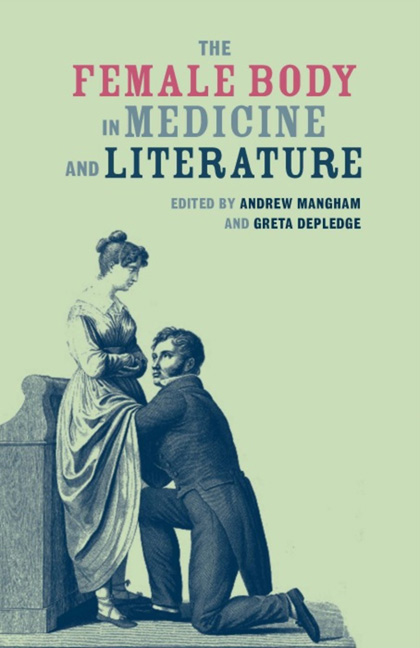Book contents
- Frontmatter
- Contents
- Acknowledgements
- Notes on Contributors
- 1 Introduction
- 2 ‘Difficulties, at present in no Degree clear'd up’: The Controversial Mother, 1600–1800
- 3 Monstrous Issues: The Uterus as Riddle in Early Modern Medical Texts
- 4 Surveilling the Secrets of the Female Body: The Contest for Reproductive Authority in the Popular Press of the Seventeenth Century
- 5 ‘Made in Imitation of Real Women and Children’: Obstetrical Machines in Eighteenth-Century Britain
- 6 Transcending the Sexed Body: Reason, Sympathy, and ‘Thinking Machines’ in the Debates over Male Midwifery
- 7 Emma Martin and the Manhandled Womb in Early Victorian England
- 8 Narrating the Victorian Vagina: Charlotte Brontë and the Masturbating Woman
- 9 ‘Those Parts Peculiar to Her Organization’: Some Observations on the History of Pelvimetry, a Nearly Forgotten Obstetric Sub-speciality
- 10 ‘She read on more eagerly, almost breathlessly’: Mary Elizabeth Braddon's Challenge to Medical Depictions of Female Masturbation in The Doctor's Wife
- 11 Mrs Robinson's ‘Day-book of Iniquity’: Reading Bodies of/and Evidence in the Context of the 1858 Medical Reform Act
- 12 Rebecca's Womb: Irony and Gynaecology in Rebecca
- 13 Representations of Illegal Abortionists in England, 1900–1967
- 14 Afterword: Reading History and/as Vision
- Index
13 - Representations of Illegal Abortionists in England, 1900–1967
- Frontmatter
- Contents
- Acknowledgements
- Notes on Contributors
- 1 Introduction
- 2 ‘Difficulties, at present in no Degree clear'd up’: The Controversial Mother, 1600–1800
- 3 Monstrous Issues: The Uterus as Riddle in Early Modern Medical Texts
- 4 Surveilling the Secrets of the Female Body: The Contest for Reproductive Authority in the Popular Press of the Seventeenth Century
- 5 ‘Made in Imitation of Real Women and Children’: Obstetrical Machines in Eighteenth-Century Britain
- 6 Transcending the Sexed Body: Reason, Sympathy, and ‘Thinking Machines’ in the Debates over Male Midwifery
- 7 Emma Martin and the Manhandled Womb in Early Victorian England
- 8 Narrating the Victorian Vagina: Charlotte Brontë and the Masturbating Woman
- 9 ‘Those Parts Peculiar to Her Organization’: Some Observations on the History of Pelvimetry, a Nearly Forgotten Obstetric Sub-speciality
- 10 ‘She read on more eagerly, almost breathlessly’: Mary Elizabeth Braddon's Challenge to Medical Depictions of Female Masturbation in The Doctor's Wife
- 11 Mrs Robinson's ‘Day-book of Iniquity’: Reading Bodies of/and Evidence in the Context of the 1858 Medical Reform Act
- 12 Rebecca's Womb: Irony and Gynaecology in Rebecca
- 13 Representations of Illegal Abortionists in England, 1900–1967
- 14 Afterword: Reading History and/as Vision
- Index
Summary
The abortionist is a shadowy figure in the history of British gynaecology in the twentieth century. Before the 1967 Abortion Act, which for doctors, provided a legal defence for performing abortions, those accused, tried, and convicted of carrying out terminations were often demonized. The medical profession, the legal system, and the media regularly expressed shock and horror at the violent injury and death sustained by those women who placed themselves under the care of the untrained and unskilled. An important focus of contemporary allegations rested on the methods used to procure abortions, and the gynaecological knowledge and skills of those employing them. Estimates of the annual number of illegal abortions always greatly exceeded the number of deaths attributed to the crime. Yet medical literature, popular culture, and journalistic exposés did much to preserve the more shocking elements of abortion practices. Analogously, popular histories have leaned towards sensationalist accounts of individual abortionists. This essay provides an analysis of the parallels and contradictions between the available empirical evidence and contemporary representations of abortionists and their methods. It explores early to mid-twentieth century (mis)perceptions in relation to medical professionalization, and scientific and cultural ideas on health and hygiene.
The following assessment draws upon a sample of abortionists extracted from criminal investigations and trials conducted in England between 1900 and 1967. Many were tried under the Offences Against the Person Act of 1861. Sections 58 and 59 of this statute made it a criminal offence for a woman to abort herself and for others to supply or procure any poison, noxious thing, or instrument with the intention of using it to procure a miscarriage unlawfully. This offence was punishable by imprisonment from three years to life. When an abortion ended in the death of a woman, an accused might also face the charge of murder or manslaughter. By definition, an abortionist was anyone who performed the operation. For present purposes, women who induced their own abortions, as well as those men who procured the abortions of their wives and lovers, are excluded. Not only is the evidence of both phenomena statistically negligible when measured against that for other categories of abortionists but contemporaries also viewed these offenders quite differently.
- Type
- Chapter
- Information
- The Female Body in Medicine and Literature , pp. 196 - 215Publisher: Liverpool University PressPrint publication year: 2012



